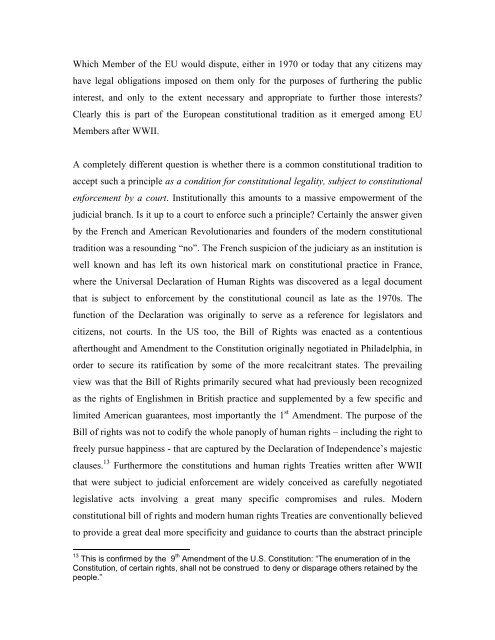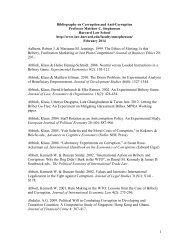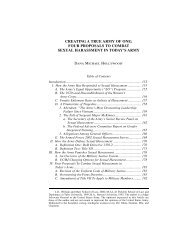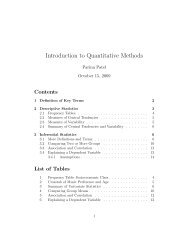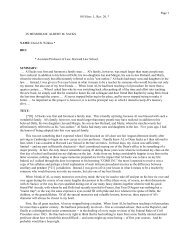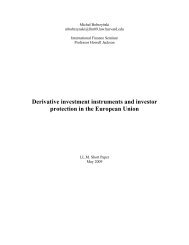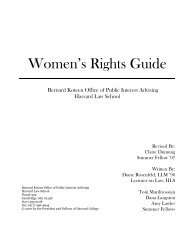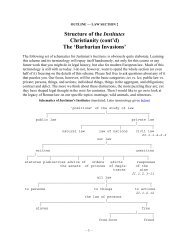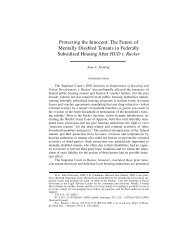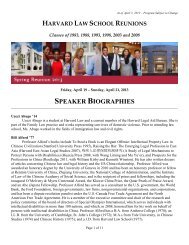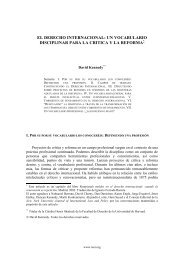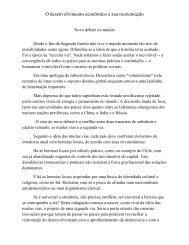Internationale Handelsgesellschaft, Nold and the New Human ...
Internationale Handelsgesellschaft, Nold and the New Human ...
Internationale Handelsgesellschaft, Nold and the New Human ...
Create successful ePaper yourself
Turn your PDF publications into a flip-book with our unique Google optimized e-Paper software.
Which Member of <strong>the</strong> EU would dispute, ei<strong>the</strong>r in 1970 or today that any citizens may<br />
have legal obligations imposed on <strong>the</strong>m only for <strong>the</strong> purposes of fur<strong>the</strong>ring <strong>the</strong> public<br />
interest, <strong>and</strong> only to <strong>the</strong> extent necessary <strong>and</strong> appropriate to fur<strong>the</strong>r those interests?<br />
Clearly this is part of <strong>the</strong> European constitutional tradition as it emerged among EU<br />
Members after WWII.<br />
A completely different question is whe<strong>the</strong>r <strong>the</strong>re is a common constitutional tradition to<br />
accept such a principle as a condition for constitutional legality, subject to constitutional<br />
enforcement by a court. Institutionally this amounts to a massive empowerment of <strong>the</strong><br />
judicial branch. Is it up to a court to enforce such a principle? Certainly <strong>the</strong> answer given<br />
by <strong>the</strong> French <strong>and</strong> American Revolutionaries <strong>and</strong> founders of <strong>the</strong> modern constitutional<br />
tradition was a resounding “no”. The French suspicion of <strong>the</strong> judiciary as an institution is<br />
well known <strong>and</strong> has left its own historical mark on constitutional practice in France,<br />
where <strong>the</strong> Universal Declaration of <strong>Human</strong> Rights was discovered as a legal document<br />
that is subject to enforcement by <strong>the</strong> constitutional council as late as <strong>the</strong> 1970s. The<br />
function of <strong>the</strong> Declaration was originally to serve as a reference for legislators <strong>and</strong><br />
citizens, not courts. In <strong>the</strong> US too, <strong>the</strong> Bill of Rights was enacted as a contentious<br />
afterthought <strong>and</strong> Amendment to <strong>the</strong> Constitution originally negotiated in Philadelphia, in<br />
order to secure its ratification by some of <strong>the</strong> more recalcitrant states. The prevailing<br />
view was that <strong>the</strong> Bill of Rights primarily secured what had previously been recognized<br />
as <strong>the</strong> rights of Englishmen in British practice <strong>and</strong> supplemented by a few specific <strong>and</strong><br />
limited American guarantees, most importantly <strong>the</strong> 1 st Amendment. The purpose of <strong>the</strong><br />
Bill of rights was not to codify <strong>the</strong> whole panoply of human rights – including <strong>the</strong> right to<br />
freely pursue happiness - that are captured by <strong>the</strong> Declaration of Independence’s majestic<br />
clauses. 13 Fur<strong>the</strong>rmore <strong>the</strong> constitutions <strong>and</strong> human rights Treaties written after WWII<br />
that were subject to judicial enforcement are widely conceived as carefully negotiated<br />
legislative acts involving a great many specific compromises <strong>and</strong> rules. Modern<br />
constitutional bill of rights <strong>and</strong> modern human rights Treaties are conventionally believed<br />
to provide a great deal more specificity <strong>and</strong> guidance to courts than <strong>the</strong> abstract principle<br />
13 This is confirmed by <strong>the</strong> 9 th Amendment of <strong>the</strong> U.S. Constitution: “The enumeration of in <strong>the</strong><br />
Constitution, of certain rights, shall not be construed to deny or disparage o<strong>the</strong>rs retained by <strong>the</strong><br />
people.”


